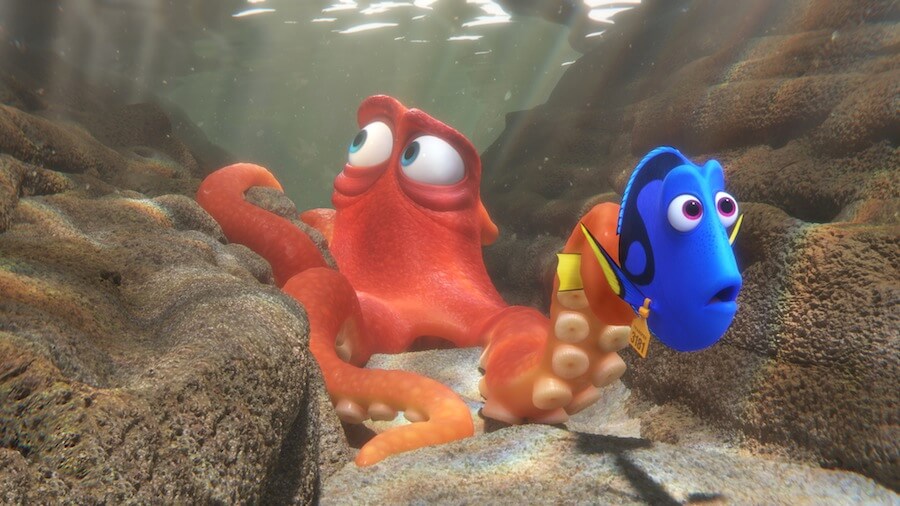‘Finding Dory’ In “Annie Hall,” Woody Allen’s Alvy Singer makes a brash move: He suggests he and Diane Keaton kiss at the start of their first date. That way they won’t be anxious and can better digest their food. Pixar gets this. In “Up” and their new “Finding Dory” they get the heavy stuff out of the way first, so we the viewers can relax and enjoy the thrills and yuks they have in store. Both begin with origin stories built to soil untold Kleenexes. In “Dory,” we learn the how of Ellen DeGeneres’ regal blue tang — the one with short-term memory loss, used as a mere very funny running gag in 2003’s “Finding Nemo.” Isn’t it so Pixar that Pixar would fix her with some sadistically earth-shattering backstory? RELATED: Interview: Lizzy Caplan talks “Now You See Me 2” and being sick of the question “Are women funny?” And so we see how young Dory got so absent-minded that she swam too far from home, losing track of her doting parents (Eugene Levy and, as it happens, Diane Keaton). That’s right: For five minutes you watch a baby fish— with eyes so big they practically absorb tears into them like two black holes — swim around the ocean, asking everyone she sees if she knows where her parents are. But slowly this opening montage turns from gut-wrenching to funny, showing her as a survivor, one able to get by thanks to her blissful ignorance. Soon“Dory” catches back up with the events of “Nemo,” at which time Dory iswhacked on the head, gifting her with random old memories that hit her in jabs. Suddenly she has a new hope: She’ll return to where she thinks her parents once lived, on what could prove a fool’s mission, with clownfish Marlin (Albert Brooks) and young Nemo (Hayden Rolence) grumpily in tow. It takes awhile for “Dory” to find its groove, which is to say to not hit repeat. Pixar has been heroic with sequels, creating ones with a reason to exist beyond cash (see: “Toy Story”s 2 and 3). But they’ve also been as bad as everyone else, with others that have been inessential (“Monsters University”) or outright demonic (“Cars 2”). Along with switching up which character is the lead, “Dory” has a good and different hook, quickly ditching the ocean for an ocean-side institute that’s part rehabilitation center, part Sea World jab. Dory and team have to bounce from one tank or attraction to the next, sometimes aided by a grouchy mimic octopus (Ed O’Neill) who actually wants to hightail it to a Cincinnati aquarium, not roam about in dangerous oceans. RELATED: Interview: Frances O’Connor on going from dramas to “The Conjuring 2” The idea of a non-human characters heading for a kind of captivity recalls “Toy Story 2,” in which Tom Hanks’ Woody flirts with the idea of finding a second act in a museum. That film, and many other Pixars, aren’t afraid to plumb zany storylines for hard truths and existential dread. (Remember in “Toy Story 3” when our beloved heroes were nearly incinerated?) But “Dory” isn’t really interested in exploring that angle; it’s more about extracting tears and laughs in alternating fashion. That’s fine, especially since the Pixar machine is adept at doing both with creativity and finesse. The madcap set pieces are air-tight and even nightmarish, including a hilariously harrowing visit to a “touching pool” where petrified fish try with little luck to avoid the grabby hands of bratty children. The super-sized climax manages to evoke one of the car chases in John Frankenheimer’s “Ronin,” this time with an octopus instead of Robert De Niro. Lurking underneath the antics, though, is a strong foundation of real, earned feeling. Much as Ernst Lubitsch had the “Lubitsch touch,” Pixar has theirs, and it involves rooting the adventures in emotions that aren’t just sad but brutally honest, sometimes even tough. Sometimes “Dory” can come across like Dory herself: absent-minded, easily distracted, moving from one shiny thrill to the next. But just as Dory can recall her earliest memories, we can’t forget the brutal opening and know what’s at stake. Anytime “Dory” slows down we can remember that this is a film about children taken away from their parents and vice versa. Likewise, we can see that Dory herself has been inverted: In the original was a purely comedic creation; now she’s tragic, her condition rendering her obliviously chipper but still oblivious. “Dory” is never as shattering as Pixar’s best and most brutal. In fact, it’s almost subtle. But it’s the kind of film that dares you to undermine it, just so it can whack you upside the head and steal one more tear.
Director: Andrew Stanton
Voices of: Ellen DeGeneres, Albert Brooks
Rating: PG
3 (out of 5) Globes
‘Finding Dory’ is one of the Pixar sequels that works

Pixar
Follow Matt Prigge on Twitter @mattprigge
























